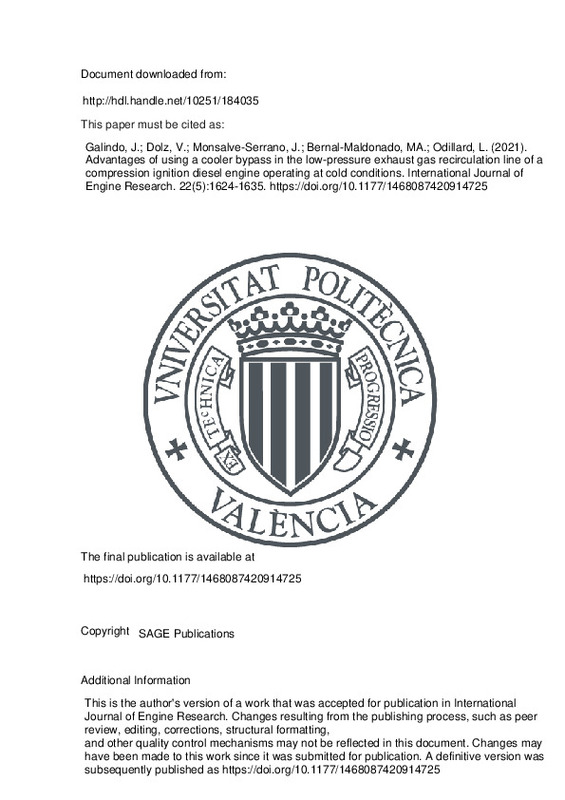Galindo, J.; Dolz, V.; Monsalve-Serrano, J.; Bernal-Maldonado, MA.; Odillard, L. (2021). Advantages of using a cooler bypass in the low-pressure exhaust gas recirculation line of a compression ignition diesel engine operating at cold conditions. International Journal of Engine Research. 22(5):1624-1635. https://doi.org/10.1177/1468087420914725
Por favor, use este identificador para citar o enlazar este ítem: http://hdl.handle.net/10251/184035
|
Título:
|
Advantages of using a cooler bypass in the low-pressure exhaust gas recirculation line of a compression ignition diesel engine operating at cold conditions
|
|
Autor:
|

 Galindo, José
Galindo, José

 Dolz, Vicente
Dolz, Vicente

 Monsalve-Serrano, Javier
Bernal-Maldonado, Miguel Angel
Odillard, Laurent
Monsalve-Serrano, Javier
Bernal-Maldonado, Miguel Angel
Odillard, Laurent
|
|
Entidad UPV:
|
Universitat Politècnica de València. Departamento de Máquinas y Motores Térmicos - Departament de Màquines i Motors Tèrmics
|
|
Fecha difusión:
|
|
|
Resumen:
|
[EN] The low efficiency of the after-treatment systems during the cold start period of the internal combustion engines leads to excessive pollutant emissions levels. To reduce the nitrogen oxide emissions at these conditions, ...[+]
[EN] The low efficiency of the after-treatment systems during the cold start period of the internal combustion engines leads to excessive pollutant emissions levels. To reduce the nitrogen oxide emissions at these conditions, it could be necessary to use the high- and low-pressure exhaust gas recirculation strategies, even operating at low temperatures. This article evaluates the impact of using a low-pressure exhaust gas recirculation cooler bypass in a Euro 6 turbocharged diesel engine running under cold conditions (-7 degrees C). A new compact line fitted with a bypass system for the cooler is used with the aim of accelerating the engine warm-up process as compared to the original low-pressure exhaust gas recirculation line. The system is evaluated following two strategies, first performing exhaust gas recirculation without bypass and then performing exhaust gas recirculation bypassing the cooler. The results show that the activation the low-pressure exhaust gas recirculation from the engine cold start leads to a significant nitrogen oxide emissions reduction. Moreover, the bypass activation leads to increase the engine intake temperature, reducing the engine warm-up time and the CO emissions due to better combustion efficiency. However, the activation of the low-pressure exhaust gas recirculation at low temperatures could produce condensation and fouling deposits on the engine components affecting their life span. These phenomena are visualized using endoscope cameras in order to identify the condensation time and the final conditions of the elements. In addition, a chemical analysis of some condensates collected during the experiments and a comparison versus other species found in the literature is presented.
[-]
|
|
Palabras clave:
|
Bypass
,
Fouling
,
Visualization
,
Low-pressure exhaust gas recirculation
,
Cold conditions
,
Nitrogen oxide reduction
|
|
Derechos de uso:
|
Reserva de todos los derechos
|
|
Fuente:
|
International Journal of Engine Research. (issn:
1468-0874
)
|
|
DOI:
|
10.1177/1468087420914725
|
|
Editorial:
|
SAGE Publications
|
|
Versión del editor:
|
https://doi.org/10.1177/1468087420914725
|
|
Código del Proyecto:
|
info:eu-repo/grantAgreement/UPV//PAID-01-17//Contratos Pre-Doctorales UPV 2017- Subprograma 1/
|
|
Descripción:
|
This is the author's version of a work that was accepted for publication in International Journal of Engine Research. Changes resulting from the publishing process, such as peer review, editing, corrections, structural formatting,
and other quality control mechanisms may not be reflected in this document. Changes may have been made to this work since it was submitted for publication. A definitive version was subsequently published as https://doi.org/10.1177/1468087420914725
|
|
Agradecimientos:
|
The author(s) disclosed receipt of the following financial support for the research, authorship, and/or publication of this article: This study was supported by the "Programa de Ayudas de Investigacion y Desarrollo ...[+]
The author(s) disclosed receipt of the following financial support for the research, authorship, and/or publication of this article: This study was supported by the "Programa de Ayudas de Investigacion y Desarrollo (PAID-01-17) de la Universitat Politecnica de Valencia.''
[-]
|
|
Tipo:
|
Artículo
|







![[Cerrado]](/themes/UPV/images/candado.png)


